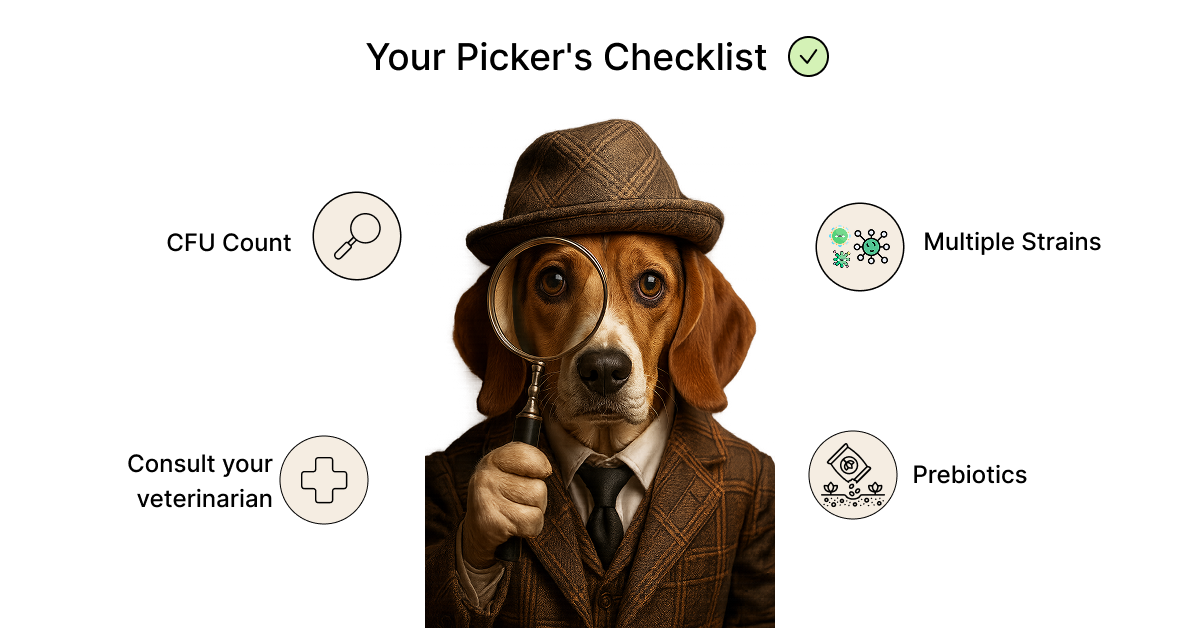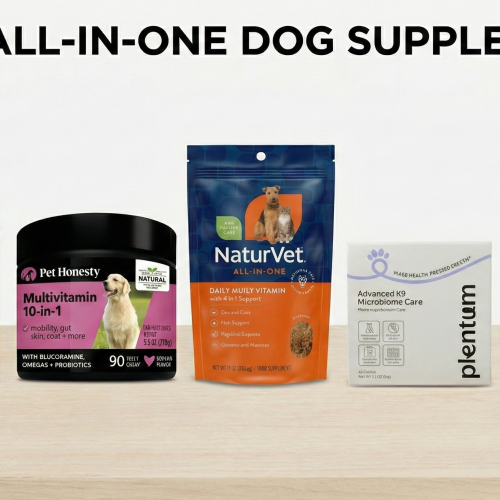New pet dog owners must address numerous questions regarding their animal’s proper care. The use of probiotics has emerged as a prominent subject in modern veterinary care because it benefits canine health. Many health benefits exist for dogs from digestive wellness to immune support. The following extensive FAQ document will explain dog probiotics to enable you to make proper decisions for your new canine companion.
Frequently Asked Questions About Dog Probiotics
- What are probiotics for dogs and what do they do?
- What are the benefits of giving my dog probiotics?
- What are the different types of dog probiotics?
- How do I choose the best probiotic for my dog?
- Which probiotic is best for my dog?
- Do various health problems such as diarrhea and allergies need specific probiotic solutions?
- What is the difference between prebiotics and probiotics?
- How do I give probiotics to my dog?
- Are there any side effects of dog probiotics?
- How long does it take for dog probiotics to work?
- Are dog probiotics worth it?
- What is the top-rated dog probiotic?
- Where can I find dog probiotic comparisons and reviews?
What are probiotics for dogs and what do they do?
Probiotics consist of live beneficial microorganisms which primarily include bacteria along with some yeasts that exist inside your dog’s digestive tract. A proper gut requires a proper balance of beneficial microbes which execute essential functions including digestion and immune response and nutrient uptake. Dog probiotic supplements contain friendly bacteria to help dogs maintain a balanced gut microbiota.
What are the benefits of giving my dog probiotics?
Your dog will experience multiple advantages when you supplement their diet with probiotics since these supplements:
- Support digestive wellness by treating and preventing gastrointestinal issues including diarrhea, gas, bloating, and constipation. Dogs with sensitive stomachs benefit most from probiotics.
- Strengthen the immune system, as a substantial part of your dog’s defense mechanism is in the gut. Probiotics help bolster natural disease defenses by maintaining optimal gut microbial health.
- Show promise in helping dogs control their immune system reactions to allergens, thus lowering the impact of skin allergies and food sensitivities.
- Help your dog absorb vitamins and minerals from their food more effectively.
- Keep the gut balance stable during stressful situations that include travel, boarding, and routine changes.
- Help prevent the formation of bacteria that lead to bad breath and plaque.
What are the different types of dog probiotics?
The market provides various probiotic products to accommodate different user preferences and health requirements.
- Powders: These can be easily sprinkled over your dog’s food.
- Chews: These serve as tasty dog treats which dogs tend to like.
- Capsules: These can be given directly or opened and the contents mixed with food.
- Fortified Foods: Some dog food products and treats contain probiotics integrated into their nutritional composition.
The primary researched probiotic strains for canine use consist of Lactobacillus and Bifidobacterium together with Enterococcus.
How do I choose the best probiotic for my dog?
When you choose a probiotic for your dog you should evaluate the following key aspects.
- Colony Forming Units (CFUs): Determine the quantity of live active bacteria contained in each dose. Products with billions of CFUs should be selected.
- Strain Diversity: A probiotic with multiple strains of bacteria may offer a broader range of benefits.
- Guaranteed Analysis: The first condition to look for in a product is a guarantee of live CFUs that remains valid until the expiration date, not only at the manufacturing time.
- Third-Party Testing: The quality and potency of products are verified through third-party testing by reputable companies.
- Dog-Specific Formula: The selection of probiotics for dogs must be done by using a product which is made especially for canines. Human probiotics have strains which are not good for dogs and some of them can cause harm to dogs.
- Your Dog’s Needs: Your dog’s age, size, and health issues should be taken into consideration. Senior dogs and dogs with sensitive stomachs have special formulations available.
Which probiotic is best for my dog?
The selection of the best probiotic depends on the particular health requirements of your dog. A broad-spectrum probiotic with a good CFU count should be the initial choice for a healthy dog. The veterinarian should be consulted for guidance when your dog has certain health issues.
Do various health problems such as diarrhea and allergies need specific probiotic solutions?
Yes, some probiotic strains have been shown to have specific effects on certain conditions:
- For diarrhea treatment, Enterococcus faecium and Bifidobacterium animalis are recommended.
- For modulating the immune system, Lactobacillus rhamnosus and Lactobacillus reuteri strains are effective.
Consult your veterinarian before using probiotics to treat any health problem.
What is the difference between prebiotics and probiotics?
The beneficial bacteria are known as probiotics and prebiotics are the nutrients that help these bacteria grow. Prebiotics are dietary fibers that dogs cannot digest. The prebiotics reach the gut where they become a food source for beneficial bacteria which leads to their multiplication and increased activity. “Synbiotics” is the term used for high-quality dog probiotic supplements that contain prebiotics together with probiotics.
How do I give probiotics to my dog?
The way of taking probiotics depends on the type of the probiotic product:
- The recommended dose of the powder should be sprinkled over the dog’s normal food.
- Chews can be offered as a treat.
- The capsule may be hidden in a treat or the powder from the capsule can be mixed with their food.
The instructions for dosage should be followed as indicated on the product label.
Are there any side effects of dog probiotics?
Probiotics are very safe for use in dogs. The beginning of a new probiotic can lead to temporary gastrointestinal problems including gas and loose stools because of the body’s adjustment period. This is usually temporary. If the side effects continue or become serious, stop using the product and seek advice from your veterinarian.
How long does it take for dog probiotics to work?
The period of time that probiotics take to produce their effects depends on the purpose of use and the characteristics of the dog. Acute cases of diarrhea will show improvement within a few days of treatment. For allergies and other chronic health issues, the effects may become visible only after several weeks of using the probiotics.
Are dog probiotics worth it?
Many dogs who have digestive problems, weak immune systems or are under stress will benefit from the use of probiotics in their health care routine. The natural approach that probiotics offer helps support the health of the body and acts as a preventive measure to keep the gut healthy. The use of probiotics for your dog should be determined with the help of your veterinarian.
What is the top-rated dog probiotic?
The “top-rated” probiotic can be subjective and may change from year to year. The probiotics that veterinarians frequently recommend usually have three main characteristics: clear labeling, third-party testing and scientific research-based formulations. Look for reviews from reputable veterinary and pet care sources for the most up-to-date recommendations.
Where can I find dog probiotic comparisons and reviews?
To find the best canine probiotics and dog probiotic reviews, look for websites and publications that specialize in unbiased pet product testing and veterinary health information. These resources often provide detailed comparisons of different brands, looking at factors like CFU count, strain diversity, ingredients, and price. These valuable guides are accessible by searching for “best dog probiotics 2025” or “dog probiotic comparison” among other terms.







